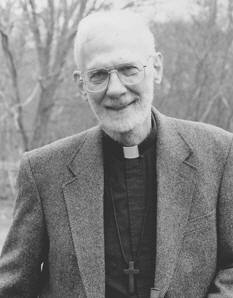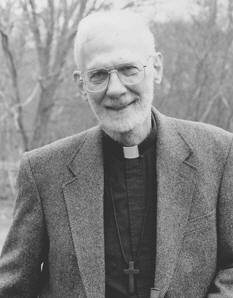
I have a vivid memory from my teenage years: my father flat on the living room couch, face up, reading a book, and chuckling every thirty seconds or so. It was perhaps the most genuine laughter I have ever heard–small, quiet, irresistible chuckles of joy, rolling off the couch one after another. I finally asked my dad what was so funny. I'll never forget the substance and style of his response. Pointing to his book, and not turning his head toward me even an inch, lest his eyes stray from the page for a moment: "This guy is great." The book? Robert Farrar Capons's Parables of Grace.
Years later, well after graduating from college, I saw the book on the shelf, and asked my dad if I could borrow the tome. Like father, like son: I laughed and laughed as I devoured Capon's treatment of the parables of Jesus. This was commentary unlike any other I had ever encountered. Here was a man, this Capon, who knew Jesus unlike anyone else I knew. Not a fabricated Jesus of Capon's own making, but a Jesus found in the text. One that had lay hidden to me for too many years as I too superficially and un-playfully read the Gospel accounts, and as I heard the parables too often too soberly preached from the pulpit.
Robert Farrar Capon. Died September 5, 2013. Age 88.
Died. Capon would want it described this way. Not "passed away." Not "departed." Not "went to be with the Lord." He died. Dead. Dead. Dead.
Many who will write tributes to the pastor, chef, and author, will undoubtedly call attention first and foremost to Capon's delightful book, The Supper of the Lamb: A Culinary Reflection. Christianity Today has already commented that Capon was "most notably" known for this work, a theological thought-tickler presented as a lamb recipe for eight, served four times. This focus is understandable, as the book is a truly unique treasure. I love the chapter in which Capon skewers the cocktail party; I think it the book's climatic moment. To Capon, the cocktail party provides the host with an excuse to not be a host, flitting about here and there, never taking responsibility for the conversation among his guests. (Hmm … in this sense, I suppose all of today's so-called "social media" is really just one big cocktail party!) Capon used the cocktail party as a foil to advance his case for the dinner party as the ideal social form of entertaining–for amusing ourselves delightfully to death. I've put his advice into practice. First, I helped stage a sizeable two-day business event in which every meal (breakfast, lunch, and dinner) was held at rectangular tables-of-eight for conversations-of-eight. (Hotel "banquet rounds" for ten inherently kill whole-table conversation.) And at home, my wife and I now sit as hosts in the middle of the long side of the dining room table when having three other couples over for dinner–that is, we're not seated at either end, as had previously been our custom.
While Supper is Capon's best known work, I would like, to call attention to two of his others. First, his Kingdom, Grace, Judgment: Paradox, Outrage, and Vindication in the Parables of Jesus. It's the book that combines Capon's three volumes, The Parables of the Kingdom, The Parables of Grace, and The Parables of Judgment in one binding. It's the most marked-up book in my entire library–highlighted in yellow, blue, and then pink; lined with black, blue and red ink–representing at least six readings through the masterpiece.
(Preacher, preacher, preacher: Don't dare prepare any sermon on any parable of Jesus without first familiarizing yourself with this tri-part book. Don't. You'll only screw it up. Along with the Sermon on the Mount, surely the parables have been fodder for the very worst of sermons over the ages. Don't add to the number. Take two Capon pillages and then see if you're really called to preach ’em in the morning.)
Capon's trilogy on the parables is a surefire remedy for "a better life now." Take the Prodigal, for example. To Capon, "the parable is an absolute festival of death." In an age when success is celebrated in so much of contemporary Christianity (pastors faithfully ministering to small flocks never headline large pastor conferences), Capon calls attention to how God loves the last, the least, the little, and the lost. In an age of oh-so slickly produced church-videos, Capon offers a helping at the Great Banquet–a "bizarre story in which a well-known socialite throws a party for people he found sitting in doorways drinking muscatel out of brown paper bags." The essential Capon: Don't be a shining lamp; just notice, and praise, and preach the lampstand, hidden (literally, unmentioned) in the text.
The other book is perhaps Capon's littlest and least known book, hidden in any bibliography of his works: The Foolishness of Preaching: Proclaiming the Gospel against the Wisdom of the World. (Yes, I am a non-preacher who reads books about preaching!) I love how the book opens, with a parable-cum-screenplay. First, Capon scripts a typical presentation of the gospel via a seaside scene in which a woman is drowning. The lifeguard/hero/Christ-figure swims out through the rough waves, fights the undertow, then drags the woman to shore, and depleted of all energy, still manages to give her mouth-to-mouth resuscitation. She was as good as dead, until … he saves her! That's one gospel, which is really no gospel at all.
Capon's version: the woman is drowning. The lifeguard swims out to her. Grabs her. Never lets her out of his grip. And then goes down with her. Down, down, down to the ocean's floor. Dead. Dead. Dead. Three days later, she arises, with him, to life. That's the gospel! Yes, that's the foolishness that saves.
And it was in this gospel foolishness that Capon loved to play. And such playfulness with Scripture is the endearing (and I trust enduring) quality of Capon's death-work, and certainly the attribute that has most profoundly sharpened my own reading and study of the Bible. It has helped me learn to look in, through, and under each and every text–looking for the death of death.
Peace, brother Capon, peace. A peace that passeth all understanding. He knew it. He has it. May we like Capon, be saved in our death, with and in Christ our Lord.
One last word, preacher–a passage from Capon's The Foolishness of Preaching:
"[O]ur preachers tell us the wrong story entirely, saying not a word about the dark side–no, that's too weak–about the dark center of the gospel. They can't bring themselves to come within a country mile of the horrendous truth that we are saved in our deaths, not by our efforts to lead a good life. Instead, they mouth the canned recipes for successful living they think their congregations want to hear. It makes no difference what kind of success they urge on us: ‘spiritual' or ‘religious' success is as irrelevant to the Gospel as is success in health, money, or love. Nothing counts but the cross. But for even a sadder thing, on the rare occasions when they do get around to proclaiming the outrageousness of salvation by death of the divine Lifeguard, they can do it for no more than fifteen minutes. In the last five minutes of the sermon they meekly take back with the right hand of plausibility everything they so boldly set forth with the left hand of paradox."
Preach this "dark center of the gospel." It's what has been entrusted to you from God, through the apostles, with saints like Robert Farrar Capon.
Jim Gilmore is author of The Experience Economy: Updated Edition.









